Are you wondering, “Do chickens eat mushrooms?” and if they are safe? There are approximately 14,000 species of mushrooms, but are they all edible for chickens, or can chickens eat all types of mushrooms?
In this article, we will discuss everything related to mushrooms for chickens and the common types of mushrooms, including which are good and bad for chickens.
Let’s begin.
Are Mushrooms OK for Chickens?
Yes, mushrooms are generally okay for chickens to eat. Many chickens enjoy eating mushrooms, whether they are wild or cultivated varieties.
Mushrooms can provide additional nutrients and variety to their diet, but it’s crucial to offer them in moderation and ensure they are safe and edible for humans and animals.
Mushrooms are generally safe and enjoyable treats for chickens. However, always exercise caution with wild mushrooms and ensure they have been adequately identified as safe for human and animal consumption.
Plus add some other things like watermelon, carrots, mangoes, broccoli, cucumber, etc to their diet for many other beneficial nutrients.
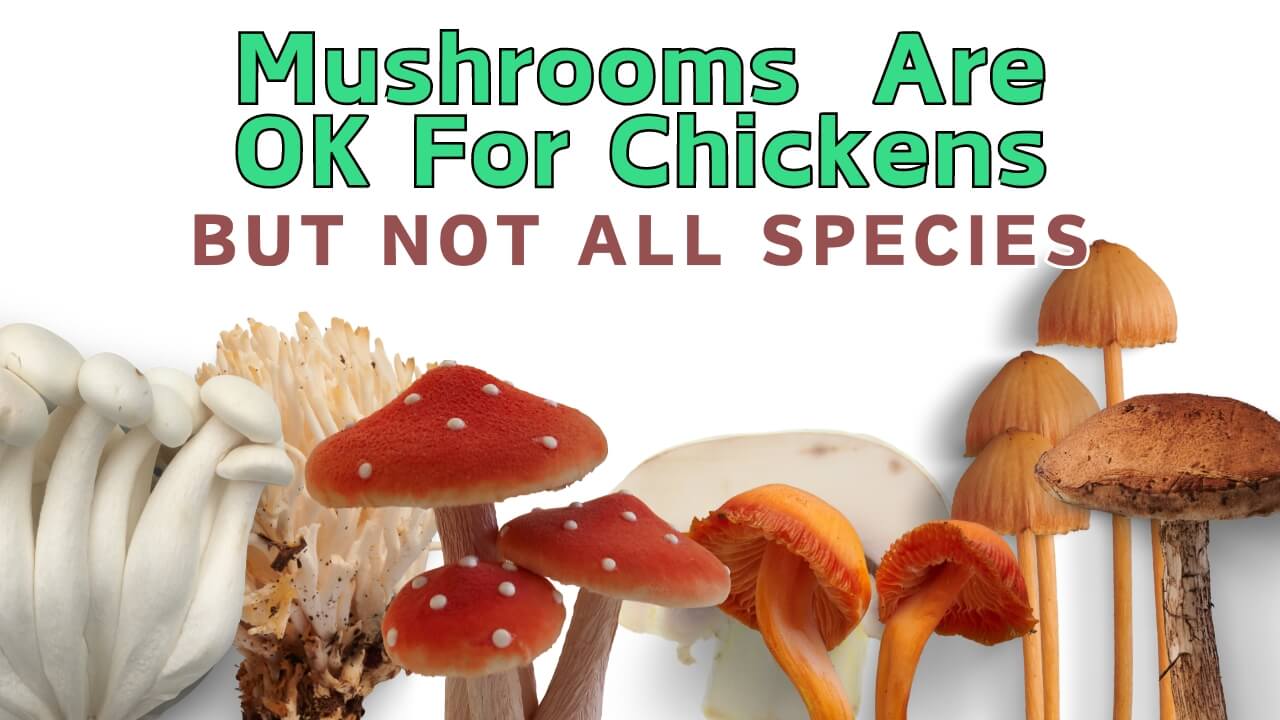
Do Chickens Eat Mushrooms?
Chickens can safely eat mushrooms, but there are around 14000 species of mushrooms, some of which are safe for chickens and some of which are toxic.
Generally, it is recommended to avoid feeding chickens mushrooms unless you’re sure they are safe, clean, and fresh.
Safe mushrooms include button mushrooms, oyster mushrooms, and others often found in grocery stores. They are safe for chickens, but even then, they should be given in moderation as treats rather than as staple food.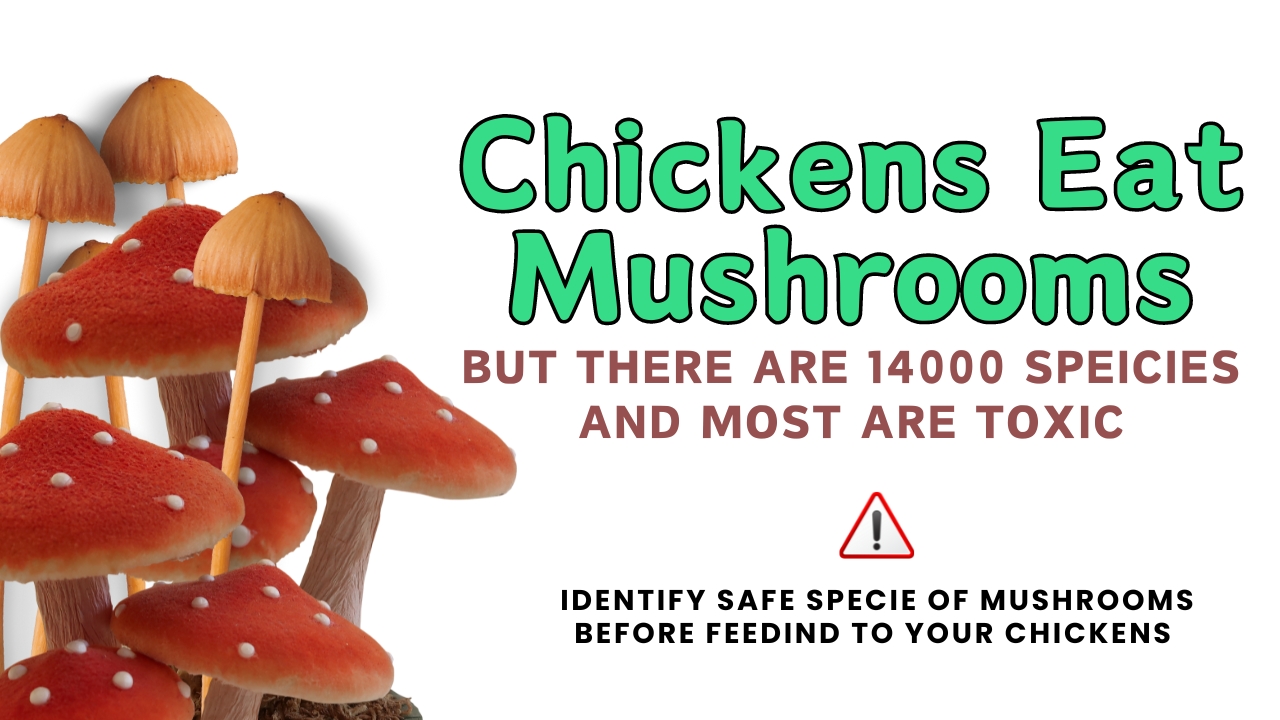
-
Can Chickens Eat Portobello Mushrooms?
Yes, chickens can eat portobello mushrooms. These mushrooms are safe and non-toxic for chickens.
They provide some nutritional benefits, such as vitamins and minerals. However, mushrooms should always be offered in moderation as part of a balanced diet.
-
Can Chickens Eat Bolete Mushrooms?
Feeding chicken bolete mushrooms is not recommended. While some bolete mushrooms are safe, others can be toxic.
However it is difficult to accurately identify safe varieties, so it is best to avoid giving them to your chickens to prevent any risk of poisoning.
-
Can Chickens Eat Button Mushrooms?
Yes, chickens can eat. Button mushrooms are familiar and safe for chickens to consume.
They can be a healthy snack, offering vitamins like B and D. Always ensure the mushrooms are fresh and clean before feeding them to your flock.
-
Can Chickens Eat Oyster Mushrooms?
Yes, chickens can eat oyster mushrooms. They are edible and safe for chickens, rich in nutrients, and can be an excellent addition to their diet.
Like with any treat, feed oyster mushrooms in moderation to maintain a balanced diet for your chickens.
-
Can Chickens Eat Shiitake Mushrooms?
Yes, chickens can eat. They are safe and nutritious for chickens and provide good vitamins, minerals, and antioxidants.
As with other mushrooms, offering them in small amounts is best to ensure a varied diet.
-
Can Chickens Eat Chanterelle Mushrooms?
Chickens can eat chanterelle mushrooms, but caution is advised. Chanterelles are generally safe, but only if you know their identification.
Misidentifying wild mushrooms can be dangerous. It is better to stick to store-bought mushrooms to avoid any risks.
-
Can Chickens Eat Lion’s Mane Mushrooms?
Yes, chickens can eat. These mushrooms are edible and safe for chickens and contain beneficial nutrients.
However, as with all mushrooms, it’s best to introduce them gradually and in moderation to ensure your chickens tolerate them well.
-
Can Chickens Eat Shaggy Mane Mushrooms?
Yes, chickens can eat These mushrooms are edible and can be a good treat for chickens.
However, they should be consumed when fresh, as shaggy mane mushrooms deteriorate quickly. Always verify the identification to avoid any toxic varieties.
-
Can Chickens Eat Turkey Tail Mushrooms?
Yes, chickens can. These mushrooms are generally safe and have medicinal properties.
While they are not a standard part of a chicken’s diet, they can be given occasionally. Always ensure they are clean and free from pesticides.
-
Can Chickens Eat Wild Mushrooms?
Feeding chickens wild mushrooms is risky. Many wild mushrooms can be toxic and difficult to identify.
It is best to avoid feeding them any wild mushrooms to prevent accidental poisoning. Stick to store-bought, known safe varieties for your chickens’ safety.
-
Can Chickens Eat Lawn Mushrooms?
No, chickens should not eat lawn mushrooms. Lawn mushrooms can be toxic, and it is difficult to identify which are safe.
To ensure the safety of your chickens, remove any mushrooms growing in their environment and provide them with known safe food sources.
-
Can Chickens Eat Puffball Mushrooms?
Chickens can eat, but only if they are certain edible varieties. If they are fresh and adequately identified as non-toxic, puffball mushrooms are generally safe for chickens.
-
Can Chickens Eat Yard Mushrooms?
It is unsafe for chickens to eat yard mushrooms, as many can be poisonous. It’s best to prevent chickens from accessing these mushrooms to avoid potential health issues.
Regularly check their roaming area and remove any mushrooms you find.
-
Can Chickens Eat Raw Mushrooms?
Yes, chickens eat. Many raw mushrooms, such as buttons and oysters, are safe and nutritious for chickens.
Ensure they are clean and fresh before feeding. Always introduce new foods slowly to monitor for any adverse reactions.
-
Can Chickens Eat Cooked Mushrooms?
Yes, chickens can. Cooking can make mushrooms easier for chickens to digest.
Ensure they are cooked plainly without added salt, oil, or seasonings. Plain, cooked mushrooms can be a healthy treat for your chickens.
-
Can Chickens Eat Dried Mushrooms?
Chickens can eat dried mushrooms, but they should be given sparingly. Dried mushrooms can be more rigid and more complicated to digest.
Rehydrating them in water before feeding can make them more accessible for chickens to consume and digest. Always introduce them gradually.
-
Can Chickens Eat Fried Mushrooms?
No, it is not recommended to feed chickens fried mushrooms. Fried foods are high in fat and can harm chickens’ health.
Instead, offer fresh, raw, or cooked mushrooms without added oils or seasonings to keep their diet healthy and balanced.
-
Can Chickens Eat Canned Mushrooms?
Canned mushrooms could be better for feeding chickens. Canned mushrooms often contain added salt and preservatives, which are bad for chickens.
Fresh or properly cooked mushrooms without additives are better for maintaining your chickens’ health.
-
Can Chickens Eat Mushroom Skins?
Yes, chickens eat the skins of mushrooms. Mushroom skins are generally safe and edible for chickens.
Ensure the mushrooms are washed thoroughly to remove pesticides or dirt before feeding them to your chickens.
-
Can Chickens Eat Mushroom Stems?
Yes, they eat mushroom stems. Mushroom stems are just as safe and nutritious as the caps.
They can be a good source of fiber and other nutrients. Ensure they are clean and offer them in moderation as part of a varied diet.
-
Can Chickens Eat Mushroom Soup?
It is not advisable to feed chickens mushroom soup. Mushroom soup often contains added ingredients like salt, cream, and spices unsuitable for chickens.
Stick to plain, fresh mushrooms to avoid harmful additives affecting their health.
-
Can Chickens Eat Mushroom Compost?
They are safe for your chickens. Some evaluators say that giving compost mushrooms to chickens has a good effect on them.
While mushroom compost benefits gardening, it can contain harmful substances, so be careful.
-
Can Chickens Eat Mushroom Scraps?
Yes, chickens can, whether scraps or a whole. But you should be cautious about which types you give them.
Safe Mushroom Species For Chickens
Mushrooms have a lot of species, and we can’t cover all of them here. However, here are some of the best mushrooms for chickens:
- Button Mushrooms
- Oyster Mushrooms
- Shiitake Mushrooms
- Portobello Mushrooms
- Matsutake or “Pine” Mushrooms
- Black Trumpet Mushrooms
- Chanterelle Mushrooms
- Baby Bella Mushrooms
- Enoki Mushrooms
- Maitake Mushrooms
- Cremini Mushrooms
- Lion’s Mane Mushrooms
- Reishi Mushrooms
- Porcini Mushrooms
- Chicken of the Woods Mushrooms
- Morel Mushrooms
Toxic Mushroom Species For Chickens
As mushrooms have a lot of varieties and we can’t cover all of them here however, here are some common species of mushrooms to never feed to your chickens:
- Death cap
- False champignon
- False morels
- Destroying angel
- False parasol
- Ivory funnel
- Webcaps
- Autumn skullcap
Can Chickens Eat Mushrooms Growing in My Yard?
Chickens can eat some mushrooms, but caution is essential. While certain mushrooms are safe and nutritious, others can be toxic.
Not all mushrooms that grow in your yard are safe; however, if you identify and know the species and they are edible and safe for chickens, you can feed them without worrying.
If you need clarification on the mushroom species that grow in your yard or help keeping your chickens away from them, you can get help from chicken experts or a veterinarian.

Can Chickens Eat Mushrooms From The Grocery Store?
Many store-bought mushrooms, such as white button, cremini, and portobello mushrooms, are safe for chickens. Grocery stores always sell safe things; no store will want to sell things that affect health.
While grocery store mushrooms are safe for chickens to eat, you are not recommended to allow your chickens to develop a habit of eating mushrooms.
Any mushrooms bought from the grocery store are excellent and safe for your chickens. Store-bought mushrooms are safer than wild mushrooms in your backyard.
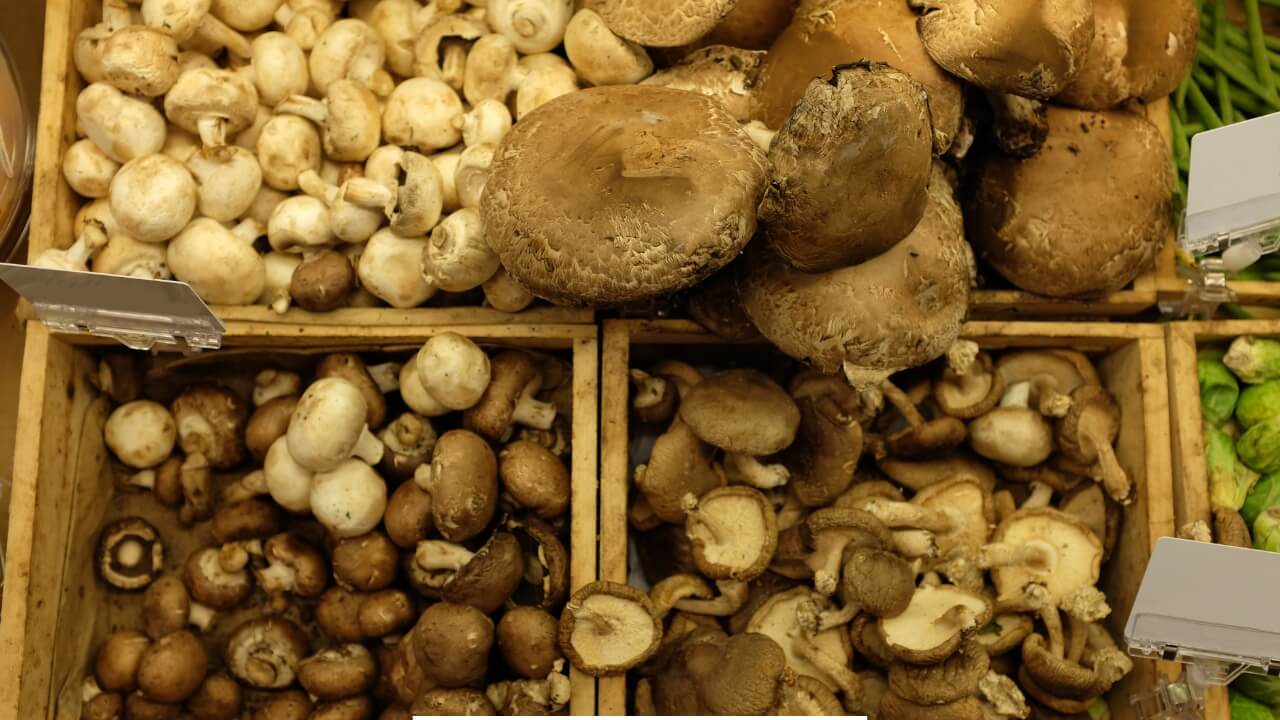
Do Baby Chickens Eat Mushrooms?
If chickens eat mushrooms, then chicks or baby chickens also eat mushrooms. However, as chicks are underdeveloped, their digestive organs are not adequately developed, so feeding mushrooms in small amounts two to three times a week is best.
Also, mushrooms require more preparation for chicks than for mature chickens. It would be better to cook the mushroom well and slice it into pieces to prevent choking.
Feed your chicks safe, clean, fresh mushrooms to prevent poisoning and other health issues.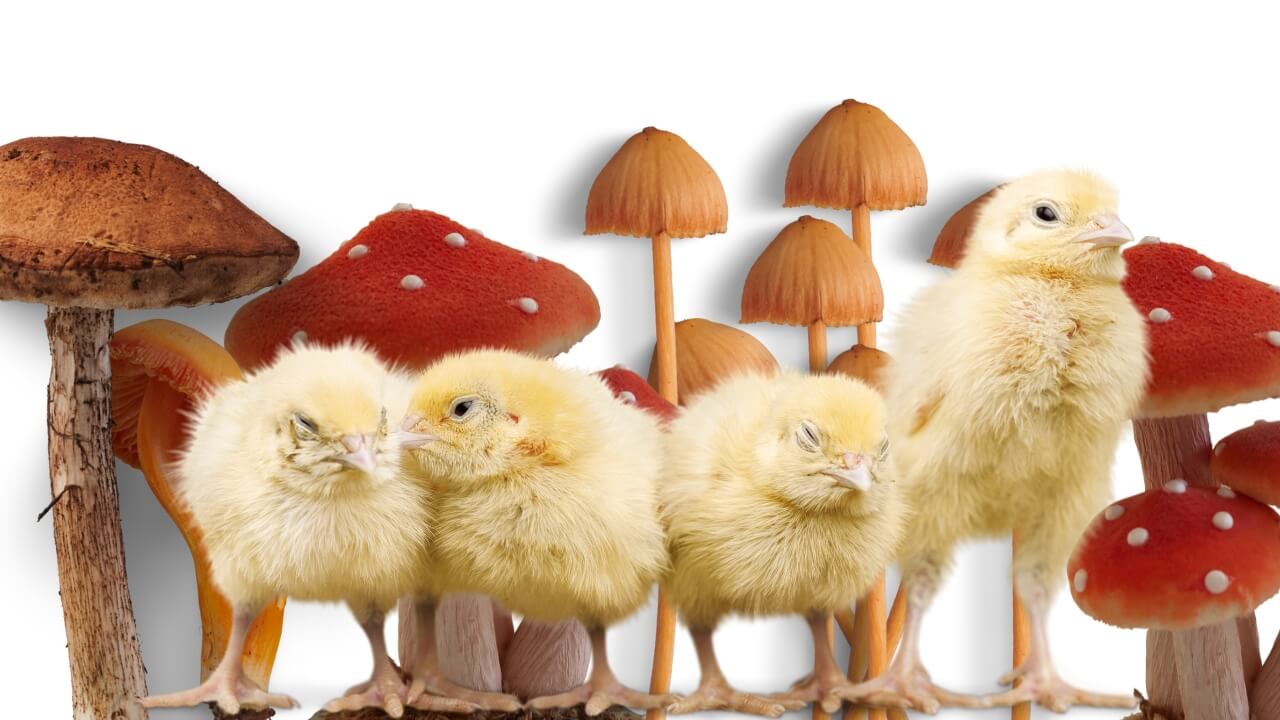
Nutritional Value of Mushrooms
Mushrooms are highly nutritious and contain many beneficial nutrients that help in egg production, muscle development, and immune system improvement.
Some nutrients are given below:
- Proteins: On average, Mushrooms can provide around 20% to 35% of their dry weight in protein, which is essential for muscle development and repair.
- Vitamins: Vitamins, especially vitamin B and vitamin D, are crucial for energy metabolism.
- Conjugated Linoleic Acid (CLA): Some mushrooms, such as oysters, contain CLA, a fatty acid with potential anti-inflammatory and weight management benefits for chickens.
- Minerals: These are selenium, potassium, and copper, which are essential for various bodily functions.
- Fiber: Mushrooms are a good source of dietary fiber that can help digestion and promote a healthy gut in chickens.
- Antioxidants: Help protect cells from damage and may reduce the risk of many diseases in chickens.
- β-Glucans: Mushrooms contain β-glucans, beneficial polysaccharides that can enhance the immune system and improve overall health in chickens.
- Other Nutrients: Mushrooms also provide small amounts of iron, zinc, and other vitamins and minerals beneficial for chickens.
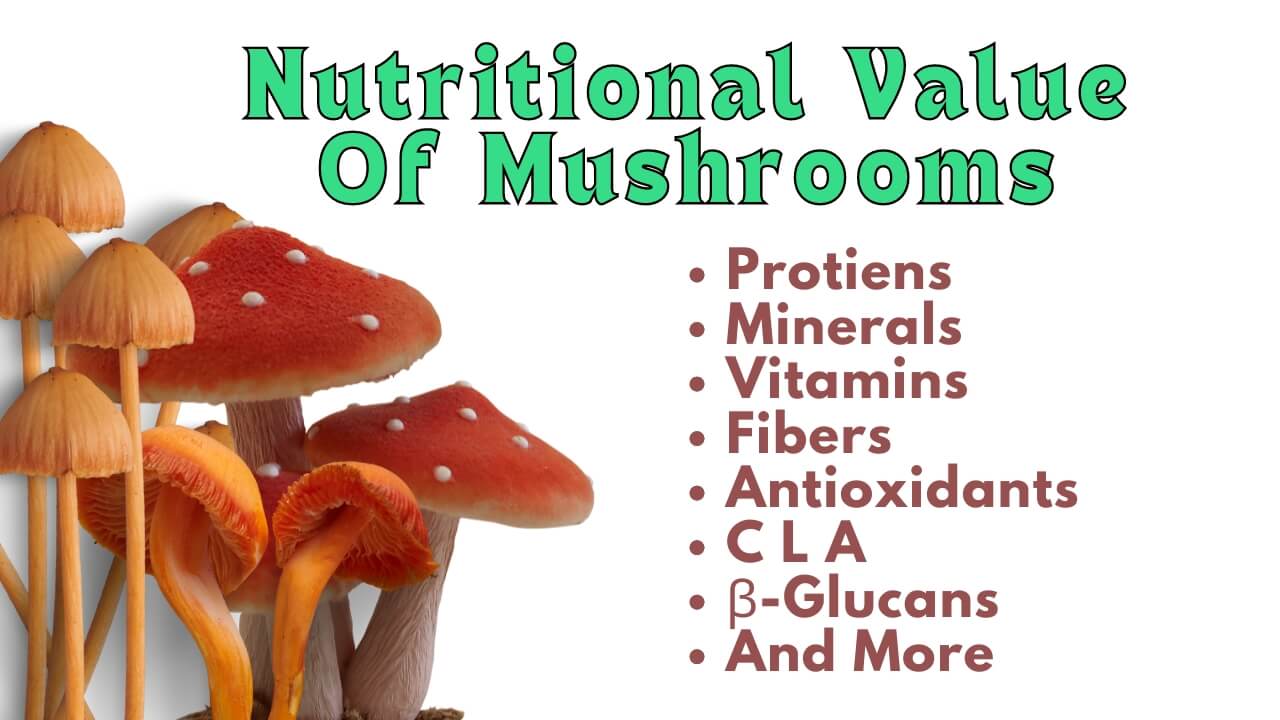
Health Benefits of Feeding Mushrooms to Chickens
Feeding mushrooms to your chickens can offer several health benefits; some include:
- Boosted Immunity: Mushrooms contain antioxidants and other compounds that enhance the immune system, helping chickens fight diseases more effectively.
- Improved Digestion: Mushrooms’ dietary fiber and zinc content aid digestion, promoting a healthy gut in chickens.
- Enhanced Growth and Development: Mushrooms contain protein, vitamins, and minerals that support growth and development, especially in young chickens.
- Influence Laying Performance: They are rich in secondary metabolites, can raise the organism’s antioxidants, and positively influence laying performance and egg quality.
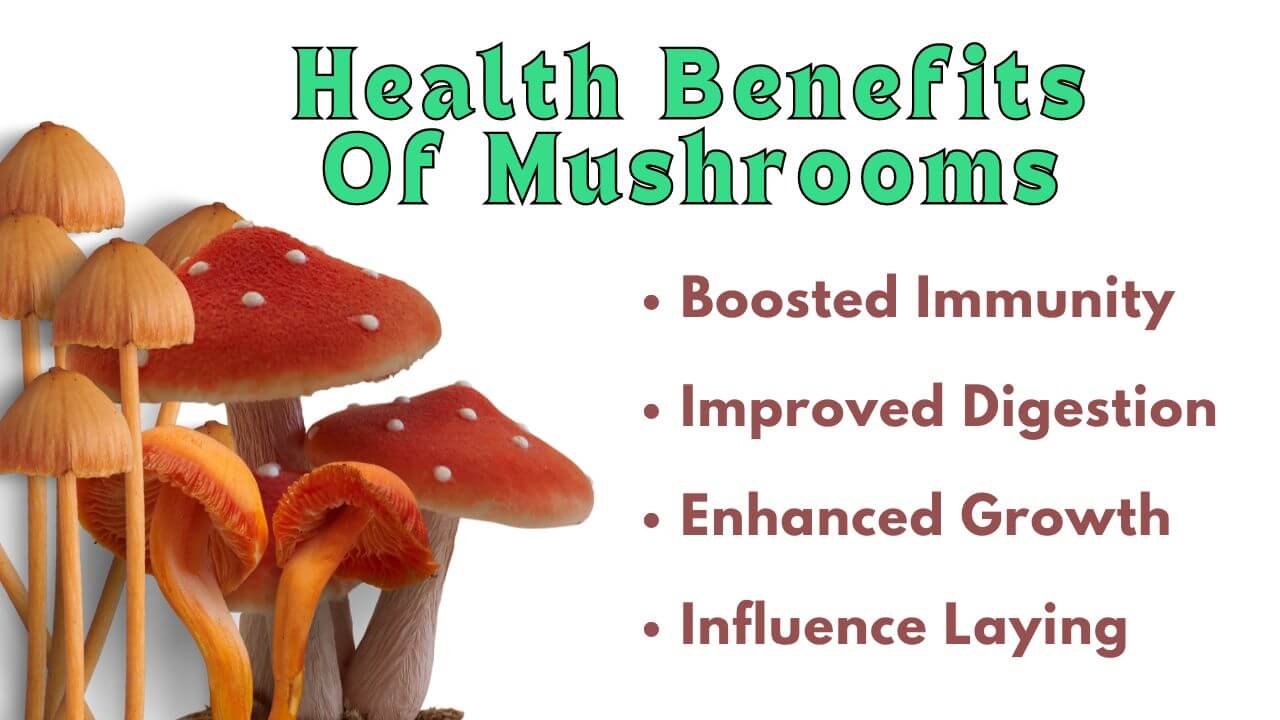
How Often to Feed Mushrooms to Chickens?
It’s recommended to feed mushrooms 2-3 times per week. This will benefit your chickens’ health. However, do not feed more than this; overfeeding can cause health issues, such as stomach upset.
After feeding mushrooms to chickens, always observe your chickens for any diverse effects, and in case of any diverse effects, lower the feeding mushrooms or even stop feeding them.
Always ensure that safe species of mushrooms are offered as a treat; they should not replace their main diet/feed.
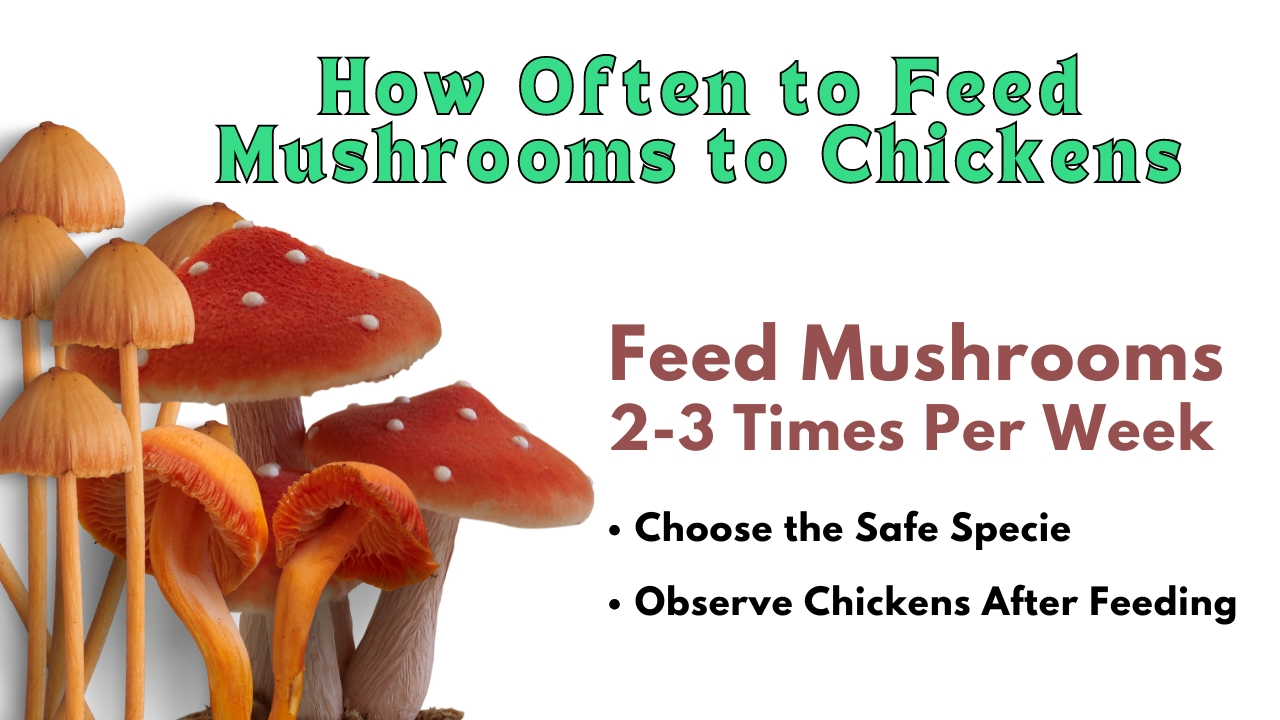
Potential Risks of Feeding Mushrooms to Chickens
While mushrooms can be beneficial, they have also potential risks:
- Toxicity: As mentioned earlier, some mushrooms are toxic. Ingesting toxic mushrooms can lead to severe health issues and even death in chickens.
- Digestive Issues: Introducing new foods, including mushrooms, should be done gradually. A sudden change in diet can cause digestive disturbances in chickens.
- Overconsumption: Overfeeding mushrooms can lead to an imbalanced diet, upset their stomach, depriving chickens of other essential nutrients.

How to Safely Introduce Mushrooms to Your Chickens
If you decide to include mushrooms in your chickens’ diet, follow these steps to introduce them to your flocks properly:
- Identify Safe Mushrooms: Ensure the mushrooms you feed to chickens are safe. Stick to common edible mushrooms like button, oyster, and shiitake mushrooms.
- Preparation: Wash the mushrooms to remove any dirt/pesticides. Chop them into small pieces to prevent choking and make them more accessible for the chickens to eat.
- Cooking Methods: Cook the mushrooms in vegetable oil or bake them without extra seasonings or butter. You can also boil them, but drain and cool them before giving them to the chickens. Avoid excessive oil, butter, or seasonings, as these can harm chickens.
- Moderation: Start by offering a small amount of mushrooms to see how your chickens react. Gradually increase the quantity, but at most 2-3 times a week.
- Balanced Diet: Chickens need a balanced diet for optimal health, so mushrooms should complement their regular food rather than replace it.
- Serving Methods: Chop or slice the cooked mushrooms into small pieces, mix them with their regular feed, or serve them separately in a dish.
Final Thoughts
So, chickens safely consume mushrooms. They offer numerous health benefits to your chickens, but feeding them in moderation is essential to avoid potential risks.
Ask yourself this question and find out which species of mushrooms are good for you and which are toxic. Then, what is good for you is suitable for the chickens, and what is harmful for you is also toxic for the chickens.
Therefore, it is crucial to accurately identify the types of mushrooms and, if they are safe, introduce them gradually and in moderation to your chickens.
We hope that this article helps you offer mushrooms to your chickens. If you have any questions or thoughts, please don’t hesitate to comment or email us.
FAQs
Do chickens eat wild mushrooms?
Chickens might peck at wild mushrooms, but it’s risky. Wild mushrooms can be poisonous, and chickens can’t differentiate between safe and harmful varieties.
Can chickens eat more mushrooms?
Mushrooms should be given in moderation. Too many mushrooms can upset their digestive system and lead to health problems.
Can chickens eat moldy mushrooms?
Chickens should never eat moldy mushrooms. Mold can be toxic and lead to serious health issues for your chickens, so always provide fresh, safe food. Also, old mushrooms can be risky for chickens if they start to spoil or grow mold. It’s best only to give them fresh mushrooms.
Are mushrooms good for chickens?
In small amounts, edible mushrooms can be good for chickens, providing some vitamins and minerals. However, they should not replace their regular balanced diet.
Can chickens eat mushrooms that grow in the yard?
Mushrooms growing in the yard can be dangerous for chickens. Unless you are sure they are safe edible types, it’s best to remove them to prevent accidental ingestion.
Are mushrooms poisonous to chickens?
Some mushrooms can be poisonous to chickens. To keep them safe, it’s vital to prevent chickens from accessing wild mushrooms or any varieties you are unsure about. Some are: Amanita species: Known for being highly toxic and potentially deadly. False Morels (Gyromitra species): Contain toxins harmful to humans and animals. Causes severe gastrointestinal issues.
Are mushrooms safe for chickens to eat?
Some mushrooms, such as common edible varieties, are safe for chickens. However, always double-check before giving any mushrooms to ensure they are not toxic.

Hello! I’m Ibrahim, the owner and writer of this blog. I run a chicken farm with 160 chickens, and I’ve gained a lot of knowledge about raising and caring for them. Now, I want to share my insights and experiences with you to help you in chicken keeping.

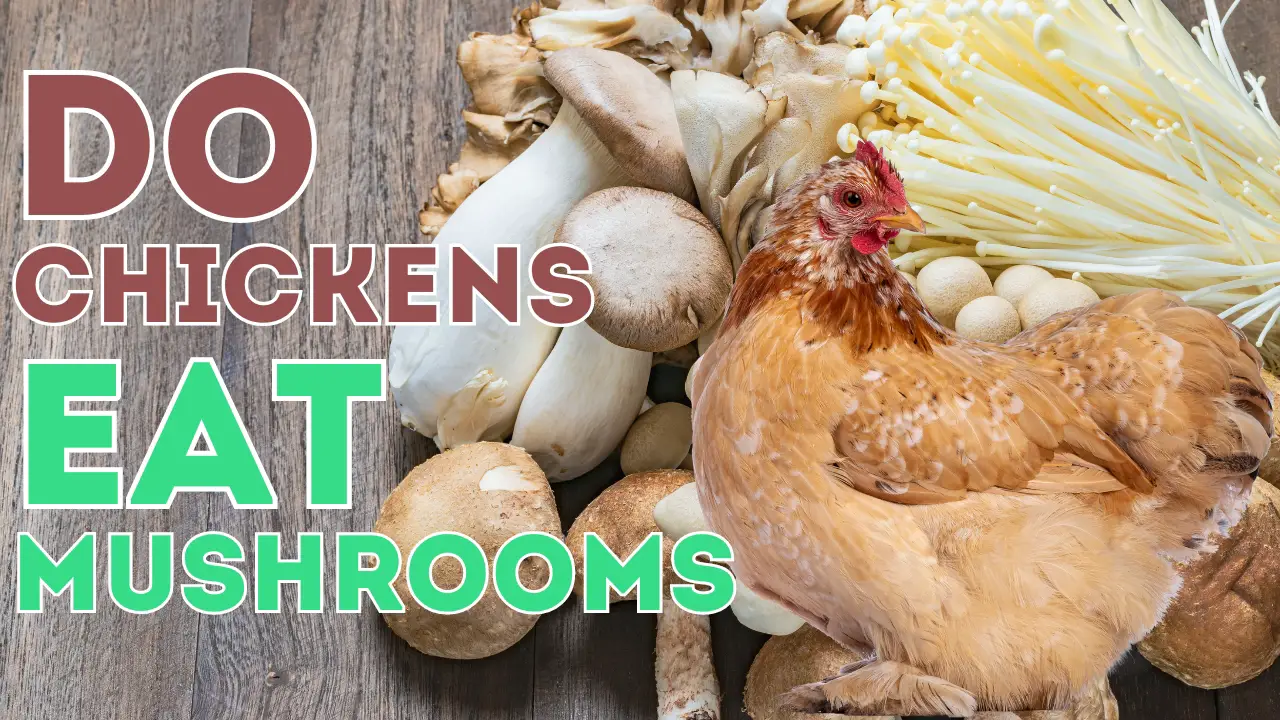
4 thoughts on “Do Chickens Eat Mushrooms | Safe and Toxic Mushrooms”